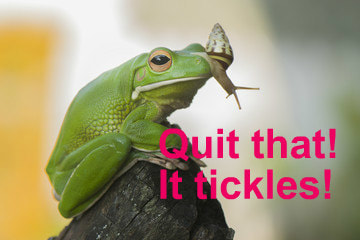Scientists have long been puzzled by ticklishness. Does it serve just as a social bonding experience or is there a deeper and underlying use that may include it as part of human survival? There have been many theories to explain this peculiar quirk. Charles Darwin argues that ticklishness was similar to the way humans laugh at a joke. He contended that "one must be in a 'light' state of mind in order to respond with laughter." Sir Francis Bacon had a different viewpoint regarding tickling. "'We see that men even in a grieved state of mind, yet cannot sometimes forbear laughing.' The opposing theories of Darwin and Bacon reflect some of the contemporary conflicts that exist in research on tickling today."
A University of Maryland neuroscientist Robert Provine, believes that ticklishness may be a form of social bonding between parent and child. He considers ticklishness to be one of the broadest and deepest subjects in science. He says that the laughter response to being tickled becomes activated within the first few months of life. It allows the newborn, he believes, to bond quickly with parents in a form of play. "It's also possible that the horseplay and other games involving tickling help us hone our ability to defend ourselves — a kind of casual combat training. This view is supported by the fact that the regions of the body that happen to be most ticklish, such as the armpits, ribs, and inner thighs, are also areas that are particularly vulnerable to attack."
But newer research into the physical response of tickling has led to the conclusion that seems to conflict with the hypothesis that ticking is a social bonding phenomenon. Why? The social bonding hypothesis really starts to fall apart when one considers those who find the experience of being tickled unpleasant. I think we've all known people who really hated being tickled. Based on those findings, it is believed that being ticklish is more of a reflex reaction than anything else.
And did you know that there is more than one kind of tickle? "Knismesis is the light, gentle tickling felt when someone runs a feather across the surface of the skin. It does not typically induce laughter and can be described as irritating and slightly itchy." Gargalesis is just the opposite...a more intense sensation that is triggered by more aggressive tickling. This form usually produces audible laughter and a little squirming! Each type of tickle produces markedly different sensations because the signals are sent through separate nerve pathways. At least that is what scientists speculate.
As my brother and I have proven, some animals are ticklish too. Experiments performed on rats (imagine trying to tickle them?) show that tickling can produce inaudible vocalizations that are similar to human laughter. Measurement of their brain activity shows that they are even more "ticklish" on their bellies and on the bottom of their feet! Sound familiar? Whether you enjoy being tickled or not, this weird phenomenon is one that continues to intrigue and babble the scientific community.
I invite you back tomorrow when my wise teacher, The Dharma Frog, will be here with another valuable life lesson. Until then, I wish you
Peace.

 RSS Feed
RSS Feed